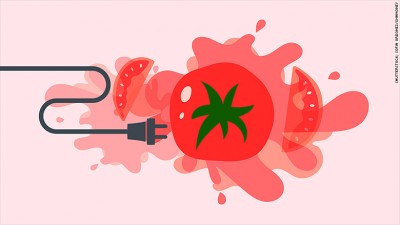
Yes, you read that correctly. Scientists have recently discovered a way to generate electricity from rotting fruits and vegetables, converting them into biological-based fuel cells. This green energy would ideally make use of the thousands and thousands of pounds of unsold, damaged, or spoiled produce that are currently being tossed by grocery stores and markets.
Tomatoes, in particular, seem to be a superfruit, as PhD student Namita Shrestha of the South Dakota School of Mines and Technology stated. They provide a “powerful source of energy when used in a biological or microbial electrochemical cell.” Additionally, the process “helps to purify the tomato-contaminated solid waste and associated wastewater.”
Assistant professor at Florida Gulf Coast University, Dr. Venkataramana Gadhamshetty has spearheaded this research project with the goal of utilizing the approximate 396,000 tons of tomato waste Florida produces every year. If the success of the research continues, Dr. Gadhamshetty predicts Disney World would be able to operate on green energy produced by this tomato waste for roughly three months.
The development of microbial gel batteries that generate currents through the breakdown of bacteria and oxidation of organic materials could be the key to this bio-energy solution. Bacteria that interacts with the waste materials releases electrons that are then captured in the fuel cell, thus creating a source of electricity.
Tomatoes have been found to be an exceptional source of generating electrical charges given that a pigment called lycopene facilitates the process rather well. According to Gadhamshetty, “typical biotechnological applications require, or at least perform better, when using pure chemicals, compared to wastes. However, we found that electrical performance using defective tomatoes was equal or better than using pure substrates.”
While the research team does recognize the current output power of the device is quite small (about 10 milligrams of tomato waste producing 0.3 watts of electricity; i.e. roughly 200 cells would be required to power a 60-watt light bulb), they are optimistic about future boosts in production. Calculations demonstrate that Florida produces enough tomato waste to realistically provide a legitimate source of power when using an optimized biological fuel cell.
The team’s findings were presented at the 251st National Meeting and Exposition of the American Chemical Society, supporting earlier findings that have implied that biofuels are more efficient generators of electricity than the traditional method of converting biomass to ethanol. Further advancements in developing this technology may soon provide a substantial source of energy for businesses, cars, homes – the possibilities are endless.
What are your thoughts? Please comment below and share this news!
This article (Tomatoes Could Potentially Power Disney World, Assert Scientists) is free and open source. You have permission to republish this article under a Creative Commons license with attribution to the author and TrueActivist.com


